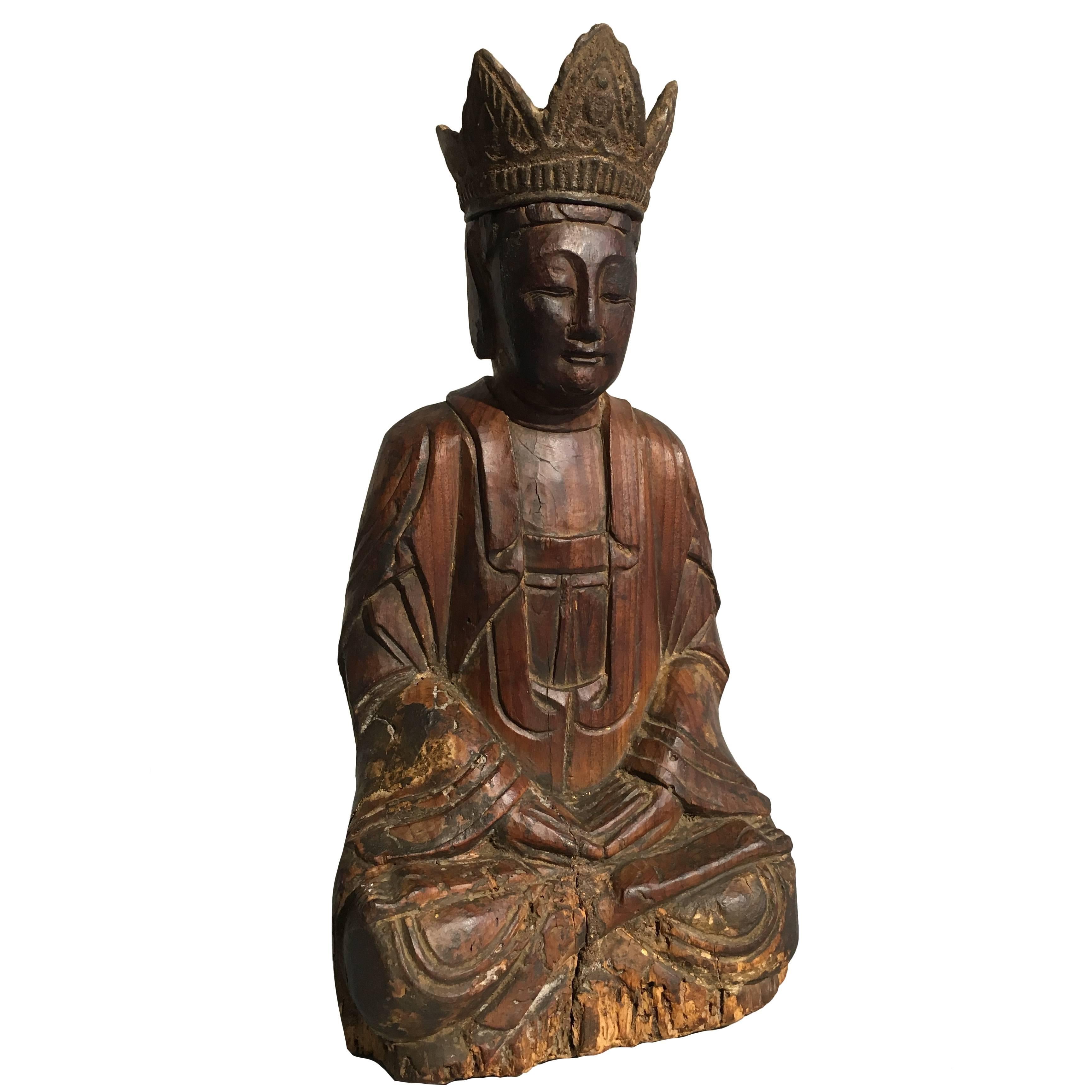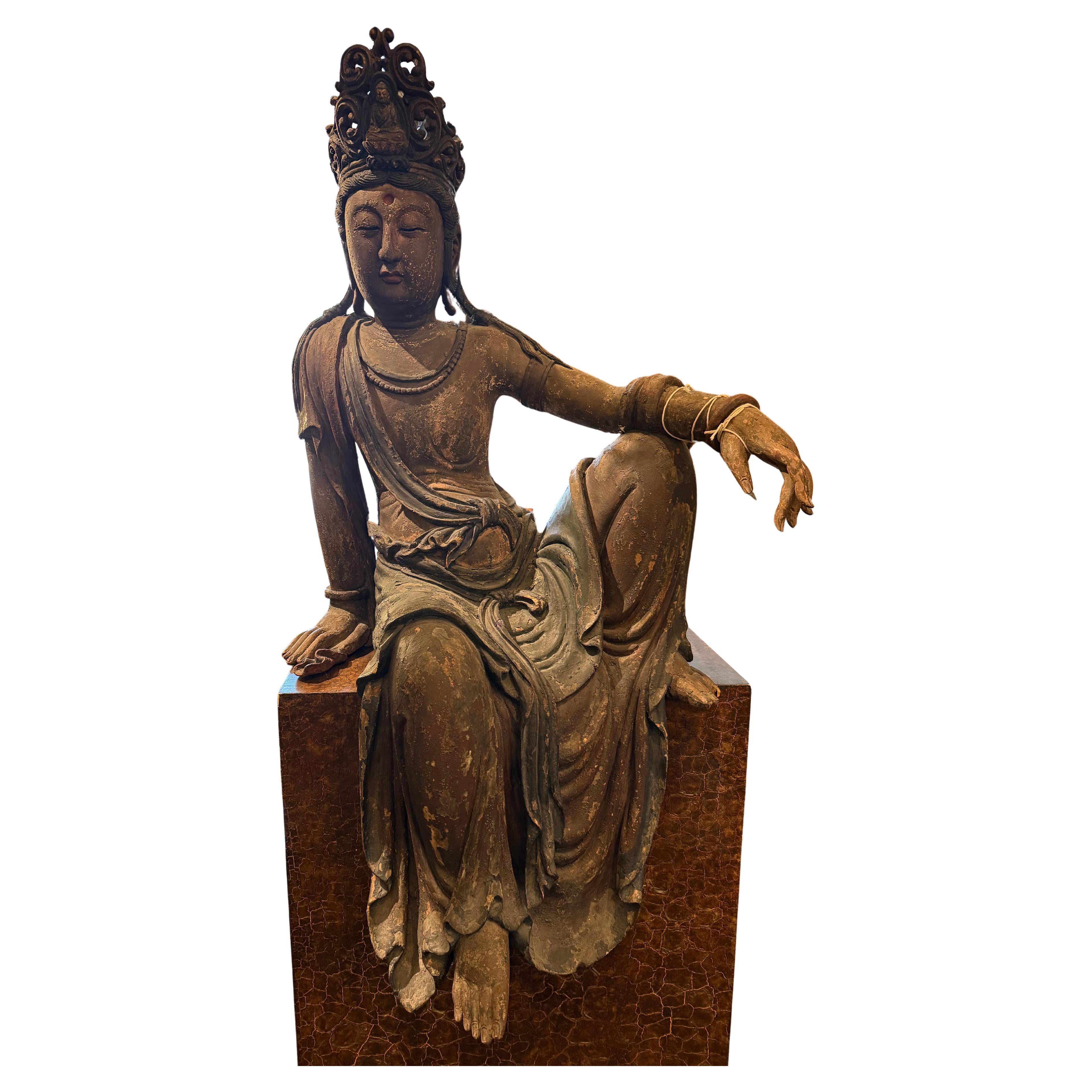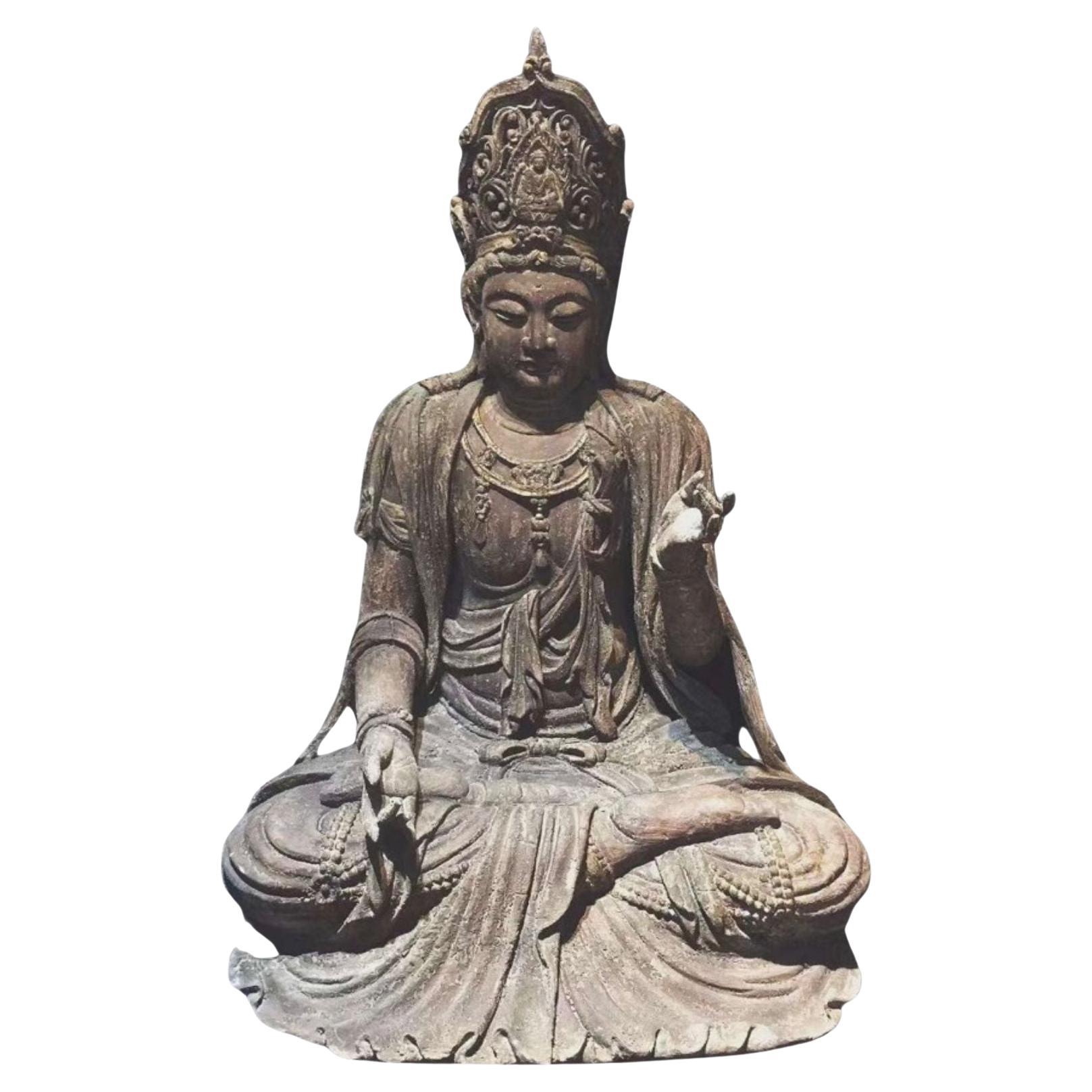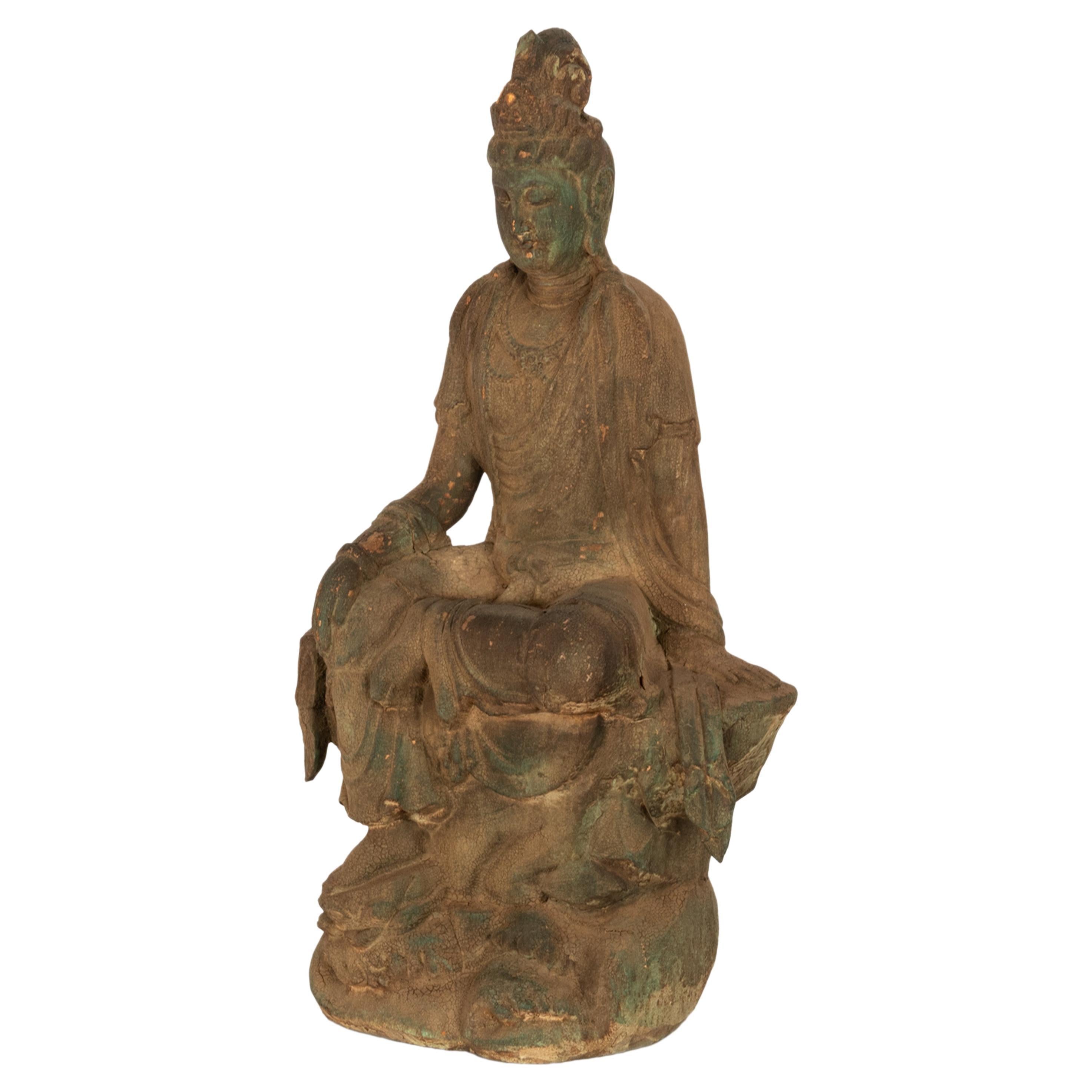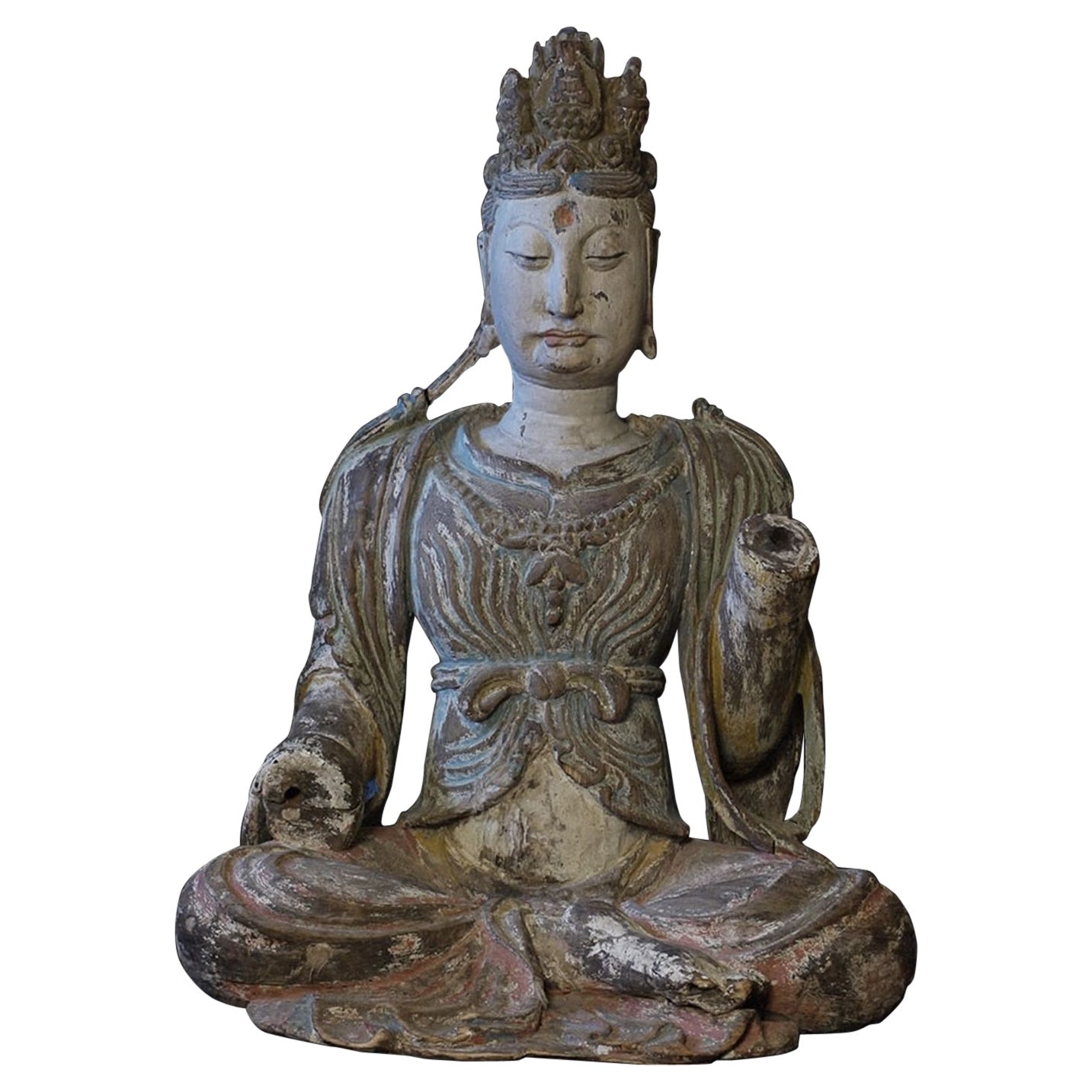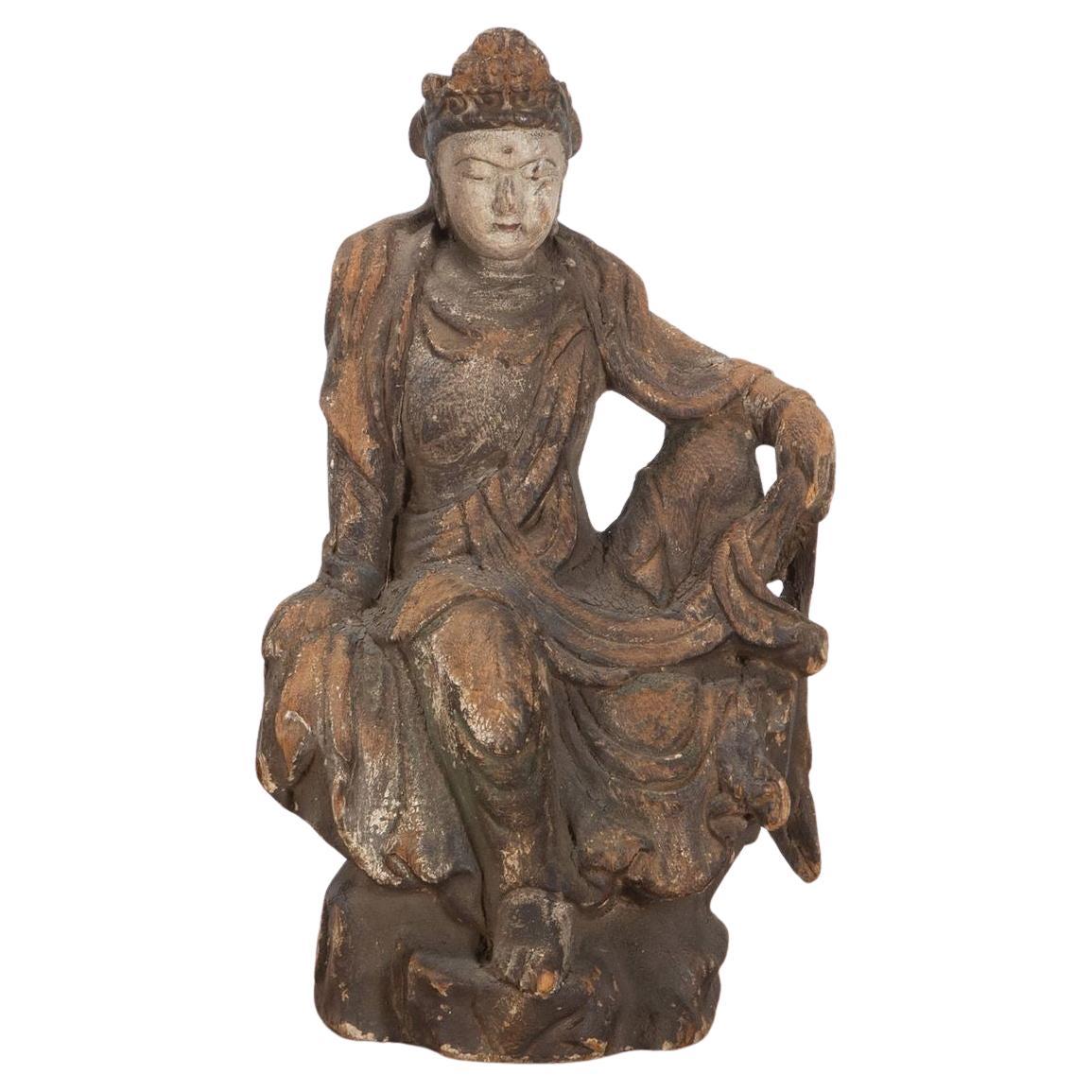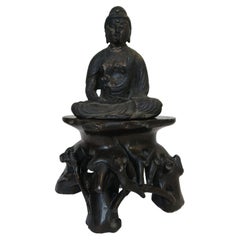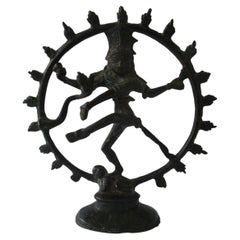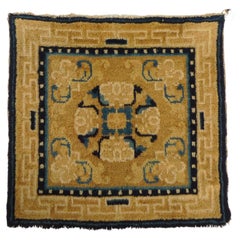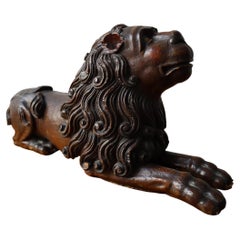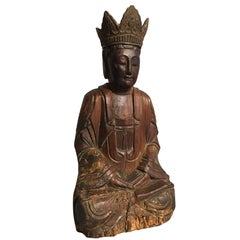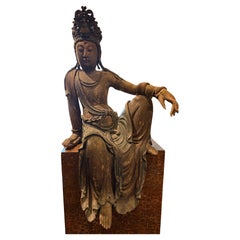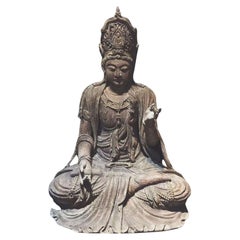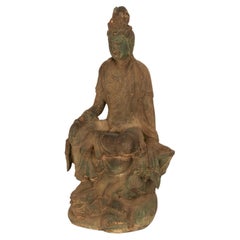Items Similar to A large wood Buddha/Guanyin with traces of pigments Ming Dynasty (1368-1644)
Want more images or videos?
Request additional images or videos from the seller
1 of 10
A large wood Buddha/Guanyin with traces of pigments Ming Dynasty (1368-1644)
$9,525.24
£7,090.92
€7,950
CA$13,047.20
A$14,511.33
CHF 7,577.37
MX$176,587.50
NOK 96,774.55
SEK 90,757.45
DKK 60,520.57
Shipping
Retrieving quote...The 1stDibs Promise:
Authenticity Guarantee,
Money-Back Guarantee,
24-Hour Cancellation
About the Item
A LARGE WOOD FIGURE OF GUANYIN WITH TRACES OF PIGMENTS
MING DYNASTY (1368-1644)
The bodhisattva is shown seated in padmasana, wearing long flowing robes, a bejewelled necklace and a high crown set with a figure of Amitayus Buddha. The face has a serene expression, with heavy-lidded eyes. The figure is covered with traces of red, and green pigments. Good condition, according to age.
- Dimensions:Height: 23.63 in (60 cm)Width: 17.72 in (45 cm)Depth: 9.85 in (25 cm)
- Style:Ming (Of the Period)
- Materials and Techniques:
- Place of Origin:
- Period:Mid-17th Century
- Date of Manufacture:1640
- Condition:Refinished. Wear consistent with age and use. Minor losses. Minor structural damages. Minor fading. Some restaurations during the centuries, some parts reglued and refixed.
- Seller Location:Vienna, AT
- Reference Number:1stDibs: LU6023232014222
About the Seller
4.9
Gold Seller
Premium sellers maintaining a 4.3+ rating and 24-hour response times
1stDibs seller since 2021
141 sales on 1stDibs
Typical response time: 6 hours
- ShippingRetrieving quote...Shipping from: Vienna, Austria
- Return Policy
Authenticity Guarantee
In the unlikely event there’s an issue with an item’s authenticity, contact us within 1 year for a full refund. DetailsMoney-Back Guarantee
If your item is not as described, is damaged in transit, or does not arrive, contact us within 7 days for a full refund. Details24-Hour Cancellation
You have a 24-hour grace period in which to reconsider your purchase, with no questions asked.Vetted Professional Sellers
Our world-class sellers must adhere to strict standards for service and quality, maintaining the integrity of our listings.Price-Match Guarantee
If you find that a seller listed the same item for a lower price elsewhere, we’ll match it.Trusted Global Delivery
Our best-in-class carrier network provides specialized shipping options worldwide, including custom delivery.More From This Seller
View AllAntique Ming Dynasty Wood-Carved Buddha and Soapstone Plinth
Located in Vienna, AT
In this listing you will find a rare original piece of historical craftsmanship. On sale is a religious statue of the Buddha. The figurine was attentivel...
Category
Antique Early 18th Century Chinese Ming Religious Items
Materials
Soapstone
Shiva Statue Nataraja Dancing Bronze Sculpture
By Shiva Lingam
Located in Vienna, AT
Shiva is one of the main gods of Hinduism. In Shivism, he is considered to the believers as the most important manifestation of the Supreme. As part of the "Houtuistic Trinity" (Trim...
Category
Antique 19th Century Indian Anglo-Indian Figurative Sculptures
Materials
Bronze
Very Soft and Early Ningxia Seat Cover from the First Half of the 19th Century
Located in Vienna, AT
This square carpet, produced around 1800-1830, with a golden yellow field once formed part of one of the long bench covers used in Tibetan monasteries or made maybe also for a single Throne seat. The cruciform design at the centre of the field represents two Tibetan dorje...
Category
Antique Early 19th Century Chinese Chinese Export Textiles
Materials
Wool
Antique Baroque Handcarved Lion Sculpture, Italian or Austrian
By Antonio Raggi
Located in Vienna, AT
Early fine carved sculpture of a lying lion. Attributed to the circle of Alessandro Vittoria, located in northern Italy/ Venice. Original late Renaissance or early Baroque figure.
T...
Category
Antique 17th Century Italian Baroque Animal Sculptures
Materials
Wood
Chinese Cloisonné Brass Vase
Located in Vienna, AT
Really beautiful brass vases.
Category
20th Century European Vases
Materials
Brass
Islamic Ottoman Inkwell and Feather Set Made From Brass and Papier Maché
Located in Vienna, AT
In this ad you get the chance to buy a unique historical object. It is an old Ottoman inkwell made from brass with typical ornaments and little turquoi...
Category
Antique 18th Century Asian Islamic Scholar's Objects
Materials
Brass
You May Also Like
Chinese Carved Wood Bodhisattva Guanyin, Late Ming Dynasty, 17th Century
Located in Austin, TX
An attractive carved wood figure of the Bodhisattva Avalokiteshvara, known as Guanyin in China, late Ming Dynasty, early 17th century, China.
Guanyi...
Category
Antique Early 17th Century Chinese Ming Sculptures and Carvings
Materials
Gesso, Wood
An Important Chinese Carved Wood Figure of Guanyin, Ming Dynasty, 17th Century
Located in ARMADALE, VIC
An Important Chinese Carved Wood Figure of Guanyin, Ming Dynasty, 17th Century
Description:
A dignified portrayal of the bodhisattva, respl...
Category
Antique 17th Century Chinese Ming Sculptures and Carvings
Materials
Wood
A Large Chinese Carved Wood Figure of Guanyin, Late Qing Dynasty
Located in ARMADALE, VIC
Description:
A singular example of Guanyin. Deviating from the Bodhisattva’s conventional pose of ‘royal ease’, the figure is instead seated in the meditative padmasana, or ‘lotus position’, rendering this Guanyin something of a rarity. An Apana more typically associated with depictions of Buddhas, Guanyin assuming this pose immediately signifies this figure as one of particular spiritual reverence. Both feet are revealed crossed upon one another from beneath fabric which spills before her, her left palm turned upward with her hand resting upon her left knee and her right raised in a relaxed gesture. Adorned with a diadem housing a depiction of Amitabha Buddha, her own spiritual guide, she exudes an air of tranquil regality, further characterised by her numerous strings of beads and elaborately fastened dhoti, attire traditionally reserved for Indian princes. Though the figure’s dress is Indian her face is undoubtedly exemplifying artistic Chinese beauty standards. Her face is soft and rounded, full in both the lips and cheeks, with eyes that restfully peer down, as though she is watching over the worries of mankind with compassion.
Notes on the item:
Guanyin is the Chinese interpretation of Avalokiteshvara, the Indian Bodhisattva of compassion. The term “Bodhisattva” is derived from the Sanskrit “Bodhi”, meaning ‘awakening’ or ‘enlightenment’, combined with “Sattva”, meaning ‘spirit’ or ‘being’, referring to one on the path to achieving enlightenment. Bodhisattvas in Mayahana Buddhism are recognised as figures who have effectively achieved enlightenment yet relinquish their accension to nirvana in order to remain amongst mankind in the ultimate act of compassion to aid as spiritual guides. As such, the Bodhisattva inhabit a liminal space between samsara and nirvana; enlightened beings that maintain a relationship with humanity that buddhas cannot, as attaining Buddhahood necessitates the abandonment of all worldly attachments, including mankind. Guanyin’s very name, ‘One who hears the cries of the world’ highlights this role as a compassionate figure who acknowledges the suffering and strife of man. Along with Mahāsthāmaprāpta, a fellow bodhisattva, Guanyin serves as an attendant to Buddha Amitabha, with these three deities recognised as the Three Sages of Western Pure Land Buddhism, a sect of Mayahana Buddhism popular in East Asia.
Avalokiteshvara is commonly posited to have been adopted from Indian Buddhism into China as Guanyin around 200-400 CE, however it was the Tang dynasty (618-907) which saw the popularisation of the deity. By the Ming (1358–1644) and Qing (1644–1911) dynasties, Guanyin held the position as the most popular female deity in China. The unique state of religion in China held no monolithic canon regarding Buddhism and saw the assimilation of several belief systems, primarily Daoism, Buddhism and Confucianism. Consequently, Guanyin became a deity to be revered beyond Buddhism alone, appointed as both an official imperial deity and Daoist deity in the 12th century. Guanyin may also be seen to fulfil the role of idealised femininity as prescribed by Confucianism, with the scarcity of female Chinese deities perhaps accounting for the gradual gender shift Guanyin underwent.
The Indian Avalokiteshvara is unequivocally recognised as male, whilst the supposed gender of Guanyin remains contentious. Although there is a clear shift from the masculine Avalokiteshvara towards a more feminine representation, it is unclear if Guanyin is understood to be entirely feminine, to inhabit qualities of both genders or to be elevated beyond gender entirely, embodying neither. Depictions of Guanyin are highly androgynous, which some believe lends credence towards Guanyin symbolising the unity of dualistic forces as recognised in Daoism, displaying the anthropomorphism of yin and yang.
Comparative Analysis:
Market comparisons of similar Qing Dynasty polychrome figures of Guanyin include lot 767 (no.2) From Christies ‘Important Chinese Ceramics and Works of Art,’ New York, 25 March 2022, with the price realised USD 52,920 (Estimate USD 20,000 – USD 30,000). Christies also auctioned a comparable polychrome Guanyin...
Category
Antique Late 19th Century Chinese Qing Sculptures and Carvings
Materials
Hardwood
Antique Chinese 18th Century Qing Dynasty Gaunyin Bodhisattva Carved Wood Statue
Located in Portland, OR
A large antique 18th Century Chinese Qing dynasty carved wooden figure statue of the Bohisattva Guanyin.
This wonderful carved statue depicts Quanyin "The one who perceives the sound...
Category
Antique 18th Century Chinese Qing Sculptures and Carvings
Materials
Wood
Ming-style Sculpture of Chinese Bodhisattva Guanyin, circa 1900s, 6518
Located in Ukiah, CA
A large Ming-style sculpture of Chinese Bodhisattva Guanyin, circa 1900s, from a century-old US collection. Dated circa 1900s based on the face (b...
Category
Early 20th Century Korean Ming Antiquities
Materials
Wood
$10,000 Sale Price
42% Off
Early 17th Century Carved Wood Figure of Guanyin
Located in Gloucestershire, GB
17th Century carved figure of Guanyin in Rajalalitasana position.
Seated on rock with the right arm rested on the right knee. The figures are wearing loose robes that open at the ch...
Category
Antique 17th Century Chinese Figurative Sculptures
Materials
Wood
More Ways To Browse
17th Century Wood Carving
Buddha Hand Carved Wood
Large Buddha Hand
Large Asian Carved Wood Sculptures
Asian Wood Carvings Red Wood
Green Buddha
Red Buddha
Large Carved Buddha
Wood Seated Buddha
Green Ming Dynasty
Ming Dynasty Sculpture
Bodhisattva Chinese
Chinese Guanyin
Ming Figure
Crown Buddha
Crowned Buddha
Antique Chinese Necklace
Chinese Wood Buddha
